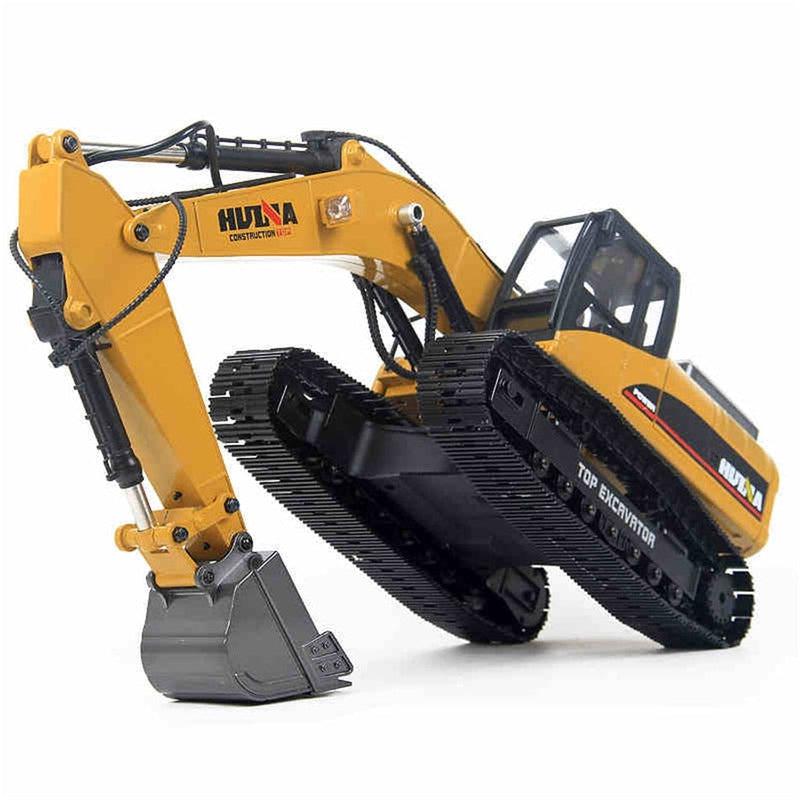Why the Double E Volvo rc excavator Stands Out in Excavation and Demolition Projects
Recognizing Just How Excavator Functions and Its Influence On Performance
Excavators play an important role in construction and mining procedures, relying on an intricate interaction of hydraulic and mechanical systems. Their capability to do a range of tasks depends upon both their design and the innovation incorporated within. Recognizing these parts can greatly impact operational effectiveness and efficiency. As improvements remain to reshape the industry, one must consider exactly how these modifications will certainly influence future methods and performance.
The Basics of Excavator Mechanics

The Function of Hydraulic Systems in Excavators
At the heart of excavator procedure lies the hydraulic system, which plays a pivotal duty in powering the maker's functions and movements. This system makes use of pressurized hydraulic liquid to move power, allowing various activities such as lifting, digging, and moving. By utilizing the principles of hydraulics, excavators can do jobs with remarkable precision and pressure, boosting overall operational efficiency.The hydraulic system includes crucial elements, including pumps, cyndrical tubes, and shutoffs, which interact to manage the circulation and instructions of the liquid. When the operator engages the controls, the hydraulic liquid is directed to details cylinders, translating the driver's commands right into physical movement. This device enables receptive and smooth actions, which are important in building and construction and excavation atmospheres. double e volvo rc excavator. The effectiveness of the hydraulic system directly influences the performance and adaptability of the excavator, making it an indispensable element in modern excavation procedures
Secret Components of an Excavator
Recognizing the vital elements of an excavator is important for understanding how this effective equipment runs. An excavator contains a number of considerable elements, including the undercarriage, residence, boom, bucket, and arm. The undercarriage provides security and flexibility, typically featuring tracks or wheels to browse various surfaces. The home contains the engine and hydraulic systems, permitting the driver to control activity and power the device. The boom extends from the residence, allowing upright reach, while the arm links to the bucket, promoting digging and training operations.Additionally, the taxicab houses the operator, geared up with controls for specific maneuvering. Each of these components plays a vital function in the excavator's total performance, adding to its effectiveness and efficiency on building and construction sites. Recognizing these components assists in keeping and enhancing excavator efficiency, guaranteeing jobs are completed safely and properly.
Attachment Adaptability and Its Benefits
Add-on versatility is an essential element of excavators, allowing drivers to switch over in between numerous devices customized for certain jobs. This versatility not only enhances job efficiency but also adds to cost-effectiveness by reducing the need for several machines. Understanding the different sorts of add-ons offered can significantly impact the overall performance and functionality of an excavator on work sites.
Sorts of Add-ons
While excavators are mostly acknowledged for their digging capabilities, their true convenience hinges on the large range of accessories available. These add-ons enhance the excavator's capability, allowing it to carry out different jobs beyond excavation. Common attachments consist of buckets (for excavating and scooping), hydraulic thumbs (for grasping products), and augers (for piercing openings) Grapples are used for managing and relocating particles, while rippers can separate tough surface areas. Various other specialized accessories, such as trenchers and rakes, make it possible for excavators to adjust to certain task demands. This diversity not just boosts the machine's energy across different fields, including building, demolition, and landscaping, but additionally enables operators to customize their devices to meet details job demands successfully.
Increased Job Performance
Maximizing work effectiveness is a primary benefit of utilizing numerous excavator accessories. Various accessories permit an excavator to do multiple tasks without requiring to change equipment, saving beneficial time and labor. Making use of a hydraulic hammer can break concrete while a container accessory can dig deep into dirt, allowing a smooth workflow. This adaptability reduces downtime linked with tools changes and enhances productivity on-site. Additionally, specialized add-ons boost accuracy in jobs such as grading or landscape design, bring about greater top quality end results. The ability to adapt to different job requirements not only streamlines operations but also reduces the requirement for extra machinery, guaranteeing that projects are completed quickly and properly. On the whole, attachment convenience considerably contributes to increased task efficiency in excavation work.
Cost-Effectiveness and Versatility
Cost-effectiveness is a considerable advantage of utilizing functional excavator add-ons. These add-ons enable a single excavator to carry out multiple tasks, reducing the need for additional equipment and labor - double e volvo rc excavator. By changing between pails, hammers, and grapples, operators can take on numerous jobs, from digging to demolition, thus maximizing equipment application. This flexibility not just reduces operational costs but likewise decreases downtime related to changing equipment. In addition, the capacity to personalize excavators with specialized accessories enhances performance, as they can successfully manage diverse jobs according to job needs. In conclusion, the combination of cost-effectiveness and convenience in excavator attachments adds to enhanced operational performance and source allotment in construction and excavation projects

Advanced Modern Technology in Modern Excavators
Modern excavators are progressively furnished with sophisticated technology that changes excavation procedures. Automation enhances operations, while enhanced gas effectiveness decreases operational expenses. Additionally, clever control systems enhance accuracy and security, noting a considerable evolution in excavation equipment.
Automation in Excavation Processes
As excavation technology evolves, automation has actually emerged as an important element in boosting performance and precision on work sites. Modern excavators are furnished with advanced automated systems that assist in jobs such as grading, excavating, and trenching with minimal operator treatment. These systems use sensing units, GPS, and device discovering algorithms to ensure precise positioning and deepness control, significantly minimizing the margin for error. In addition, automation allows drivers to focus on critical decision-making instead than manual controls, causing improved efficiency on the whole. Such developments not only simplify workflows but likewise boost security by lessening human mistake in complicated operations. The combination of automation in excavation processes represents a considerable improvement in building and construction technology, driving the industry in the direction of greater efficiency and efficiency.
Improved Gas Effectiveness
Innovations in technology have also resulted in considerable enhancements in gas performance for modern excavators. Modern makers are outfitted with sophisticated engines that enhance power result while lowering fuel usage. These engines make use of ingenious combustion innovations, such as turbocharging and direct fuel shot, to boost efficiency and performance. check these guys out In addition, light-weight materials in building reduce overall weight, permitting much less power expenditure during operation. The intro of variable rate controls allows operators to adjust engine efficiency according to specific tasks, further minimizing gas use. Therefore, these improvements not just lower functional expenses however also add to ecological sustainability by decreasing exhausts. Generally, enhanced gas performance in excavators is a crucial advancement that bolsters performance and financial practicality in the construction sector.
Smart Control Equipment
While drivers navigate progressively complex work websites, wise control systems in excavators have become important devices for improving efficiency and accuracy. These innovative innovations utilize sensors and algorithms to keep an eye on various specifications such as lots weight, surface conditions, and functional performance. By instantly changing hydraulic features, smart systems optimize machine efficiency, bring about improved performance and reduced endure components. In addition, drivers take advantage of intuitive interfaces that give real-time feedback and diagnostics, enabling for informed decision-making. This combination of modern technology not just streamlines why not try this out procedures but additionally reduces human mistake, contributing to more secure workplace. As the building sector continues to progress, wise control systems will certainly play a crucial role fit the future of excavator performance and effectiveness.
Enhancing Operational Effectiveness With Excavators
Excavators play a crucial role in boosting operational effectiveness throughout numerous construction and excavation projects. Their versatility allows for multiple tasks, including product, training, and excavating handling, which simplifies operations and lowers the demand for extra tools. With effective hydraulic systems, excavators can do durable jobs with precision, considerably decreasing the time called for to full jobs. The combination of advanced technology, such as general practitioner and automated controls, better maximizes their operation, enabling drivers to attain higher accuracy and reduce product waste. In addition, contemporary excavators are made to consume much less gas and reduce exhausts, adding to both price financial savings and ecological sustainability. By using excavators efficiently, building groups can enhance productivity, meet task target dates, and enhance total website management. This multifunctionality and performance make excavators vital tools in the modern-day construction landscape.
The Future of Excavators in Building And Construction and Mining Industries
As the building and mining industries progress, the future of excavators is positioned for significant makeover driven by technological innovation and altering functional demands. Advancements in automation and artificial knowledge are improving excavator abilities, enabling enhanced accuracy and performance in operations. Autonomous excavators are arising, minimizing the requirement for human treatment and decreasing the danger of accidents.Moreover, the assimilation of telematics and IoT technology allows real-time tracking of machine efficiency and predictive upkeep, enhancing uptime. Green layouts, consisting of electrical and hybrid designs, are gaining grip, lining up with sustainability goals within the industry.Additionally, making use of advanced products and lighter styles improves gas efficiency while keeping performance standards. As these fads development, excavators will certainly play a crucial duty in satisfying the raising needs for productivity and security in construction and mining, eventually changing operational landscapes.
Regularly Asked Inquiries
How Do Weather Influence Excavator Performance?

Climate problems significantly influence excavator efficiency, as rain and mud can prevent grip and stability, while severe temperatures may influence hydraulic systems. Operators should adapt to these variables to ensure optimal functionality and safety and security during procedures.
What Precaution Should Operators Adhere To While Making Use Of Excavators?
Security actions for excavator operators consist of using appropriate individual safety devices, performing pre-operation assessments, ensuring proper communication with ground employees, preserving a secure distance from overhanging dangers, and adhering to recognized operational methods to stop crashes.
Exactly How Frequently Should Excavators Be Preserved for Optimum Performance?
Excavators ought to be kept frequently to assure peak performance, normally every 250 operating hours or as specified by the additional reading producer. Regular checks boost reliability, stop unanticipated break downs, and expand the life-span of the equipment.
What Is the Average Life Expectancy of an Excavator?
The typical life-span of an excavator typically ranges from 10,000 to 15,000 hours of operation. Aspects affecting long life include upkeep methods, running problems, and the top quality of the machine itself, affecting general productivity and performance.

Can Excavators Operate Unequal Terrain Successfully?
Excavators can run efficiently on uneven surface because of their verbalized designs and flexible tracks. These features enable them to keep stability and grip, enabling effective operation in tough settings typically encountered in building and construction and landscape design projects. Each of these parts plays a crucial role in the excavator's overall performance, adding to its performance and efficiency on building sites. Optimizing task effectiveness is a primary benefit of making use of various excavator accessories. While drivers browse increasingly complex job websites, wise control systems in excavators have emerged as essential devices for enhancing effectiveness and precision. Excavators play an important role in boosting functional effectiveness throughout different building and excavation jobs. Developments in automation and artificial knowledge are reshaping excavator capabilities, permitting for enhanced precision and effectiveness in procedures.